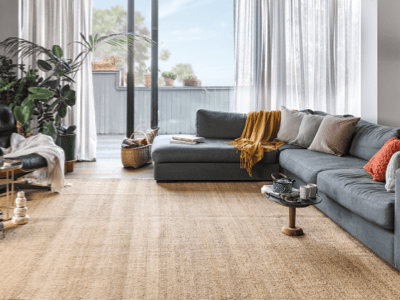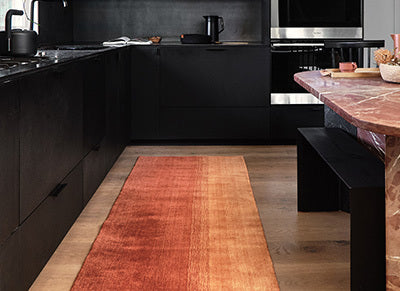














One-of-a-kind vintage rug, handwoven and handknotted in Dosemealti, Turkey
Dimensions: 6'4" x 9'3" (195 cm x 282 cm)
Almin has been professionally cleaned; age-related wear and natural inconsistencies are inherent in these unique, handcrafted vintage rugs.
Rug Type:
-
Naturally Aged
Vintage, handwoven rugs from Turkey and Morocco, selected for their color and design and preserved as-is.
Age:
-
Vintage
Typically between 20-100 years old
Main Color:
- Red
- One-of-a-kind vintage rug — only one in stock!
- 100% wool
- Dimensions: 6'4" x 9'3" (195 cm x 282 cm)
- Low pile: approximately 0.2" (0.5 cm)
- Color palette: crimson red, periwinkle blue, warm vanilla beige, walnut brown, navy, slate gray
- A variation of motifs—simple, tribal, bold, and colorful—all hailing from the Anatolian region (modern-day Turkey)
- A tree of life (a symbol found in several religions around the world) alludes to the Garden of Eden
- Anatolian in origin, a hands-on-hips motif represents a mother goddess figure (sometimes with a child in her womb)—symbolizing motherhood, fertility, and abundance
- Just like a modern-day barber's pole, this pattern features alternating slanted stripes
- A geometric, step-like pattern which expresses the primitive, artisanal qualities of weaving from nomadic cultures
- Typically associated with the Yoruk nomads of Anatolia, these latch-hook ornaments are believed to protect against sources of danger—including ill will, wild animals, and natural disasters
- A larger border is flanked by two smaller borders
Dosemealti, located in southwestern Anatolia (just north of Antalya’s seaside location), is well known for rugs that depict Anatolian-style motifs, all centered around a stylized cross.
Material DetailsWool is the most widely used fiber in Turkish rug design. Not only is it plentiful in supply, it’s durable, long-lasting, and incredibly soft—so it’s super comfy to walk and relax on.
- We recommend that you regularly vacuum your rug to remove dirt and grime. Depending on how heavily your rug is used, just once or twice a month is adequate. Too much vacuuming can wear down the knots and fibers more quickly. If you have a suction attachment on your vacuum cleaner, use that instead of a rotary vacuum.
- Every few months, you’ll also want to flip your rug over and vacuum the back to get the grit out of the foundation of the rug. It also helps to rotate your rug once a year to ensure even wear over time.
- Every 3-5 years, we recommend getting your rug professionally hand-washed. Please do not take it to get steam or dry cleaned—this will almost certainly damage the rug! Hand-washing requires the use of a pH-balanced shampoo, worked into the rug by hand with a soft-bristled brush, before being rinsed thoroughly. This process should be repeated a few times.
- In case of spills:
- If the spill is organic and non-oily (e.g., wine), use a paper towel or cloth to blot the liquid. Add some clean water sparingly to the spot to dilute the stain (or wet a paper towel or cloth) and blot. Repeat this process until the stain is removed.
- If the stain is persistent, resist the urge to scrub. Scrubbing can damage the wool fibers and more easily allow the stain to penetrate. You may try using a mild detergent, such as very diluted dishwashing soap, following the same blot-and-rinse procedure.
- If the spill is a denser, more oily liquid, try first to scoop what you can from the surface using a spoon or perhaps some heavier paper, and then do the blot-and-rinse. If the spill is significant, non-organic and/or composed of chemical substances, or the above methods don’t work, we suggest getting the rug professionally hand-washed as soon as possible.
- For rugs with deeply saturated color palettes, be sure to spot-clean them in an area that can be hosed down immediately after, as some color bleeding may occur.
Order A Sample
Almin - Rug Sample
Size 12" x 12"
Free shipping & return
Recently Viewed
Almin Vintage Turkish Rug
Scaled sale up to 30% off sitewide, ends 12/2. No code needed.
![]() Free Shipping
Free Shipping
![]() Easy Returns
Easy Returns
One-of-a-kind vintage rug, handwoven and handknotted in Dosemealti, Turkey
Dimensions: 6'4" x 9'3" (195 cm x 282 cm)
Almin has been professionally cleaned; age-related wear and natural inconsistencies are inherent in these unique, handcrafted vintage rugs.
- One-of-a-kind vintage rug — only one in stock!
- 100% wool
- Dimensions: 6'4" x 9'3" (195 cm x 282 cm)
- Low pile: approximately 0.2" (0.5 cm)
- Color palette: crimson red, periwinkle blue, warm vanilla beige, walnut brown, navy, slate gray
- A variation of motifs—simple, tribal, bold, and colorful—all hailing from the Anatolian region (modern-day Turkey)
- A tree of life (a symbol found in several religions around the world) alludes to the Garden of Eden
- Anatolian in origin, a hands-on-hips motif represents a mother goddess figure (sometimes with a child in her womb)—symbolizing motherhood, fertility, and abundance
- Just like a modern-day barber's pole, this pattern features alternating slanted stripes
- A geometric, step-like pattern which expresses the primitive, artisanal qualities of weaving from nomadic cultures
- Typically associated with the Yoruk nomads of Anatolia, these latch-hook ornaments are believed to protect against sources of danger—including ill will, wild animals, and natural disasters
- A larger border is flanked by two smaller borders
Dosemealti, located in southwestern Anatolia (just north of Antalya’s seaside location), is well known for rugs that depict Anatolian-style motifs, all centered around a stylized cross.
Material DetailsWool is the most widely used fiber in Turkish rug design. Not only is it plentiful in supply, it’s durable, long-lasting, and incredibly soft—so it’s super comfy to walk and relax on.
- We recommend that you regularly vacuum your rug to remove dirt and grime. Depending on how heavily your rug is used, just once or twice a month is adequate. Too much vacuuming can wear down the knots and fibers more quickly. If you have a suction attachment on your vacuum cleaner, use that instead of a rotary vacuum.
- Every few months, you’ll also want to flip your rug over and vacuum the back to get the grit out of the foundation of the rug. It also helps to rotate your rug once a year to ensure even wear over time.
- Every 3-5 years, we recommend getting your rug professionally hand-washed. Please do not take it to get steam or dry cleaned—this will almost certainly damage the rug! Hand-washing requires the use of a pH-balanced shampoo, worked into the rug by hand with a soft-bristled brush, before being rinsed thoroughly. This process should be repeated a few times.
- In case of spills:
- If the spill is organic and non-oily (e.g., wine), use a paper towel or cloth to blot the liquid. Add some clean water sparingly to the spot to dilute the stain (or wet a paper towel or cloth) and blot. Repeat this process until the stain is removed.
- If the stain is persistent, resist the urge to scrub. Scrubbing can damage the wool fibers and more easily allow the stain to penetrate. You may try using a mild detergent, such as very diluted dishwashing soap, following the same blot-and-rinse procedure.
- If the spill is a denser, more oily liquid, try first to scoop what you can from the surface using a spoon or perhaps some heavier paper, and then do the blot-and-rinse. If the spill is significant, non-organic and/or composed of chemical substances, or the above methods don’t work, we suggest getting the rug professionally hand-washed as soon as possible.
- For rugs with deeply saturated color palettes, be sure to spot-clean them in an area that can be hosed down immediately after, as some color bleeding may occur.






